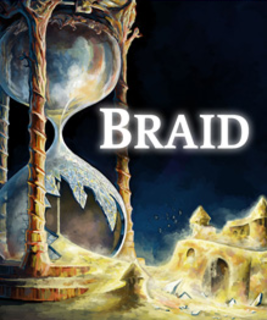Brilliant concept, somewhat sloppy execution.
But the story really isn't what this game is all about. The essence of the game is its unique time-traveling platforming action. And the game does manage to make this work surprisingly well for a majority of the game. The early puzzles are fairly straightforward and introduce the game's basic concepts, and each "World" has its own unique theme and gameplay mechanic associated with them. Essentially, your character uses his ability to reverse time, suspend time (in a localized area), and a few more tricks to make his way through the levels and collect puzzle pieces that may or may not reveal clues to the backstory. Think of it kind of as "Prince of Persia: The Sands of Time" in more of a Super Mario style. Early on, the game does a fantastic job of implementing its unique gameplay mechanics, teaching the player how they can be used in different situations.
Later in the game, however, the game's design falters, and the player is forced to figure out new abilities or techniques on his own. One example is a level in the second halfof the game in which the player is required to jump at an enemy from below to bounce it up to a higher platform. The problem is that the game never gives the player any reason to try this technique, since the player is taught at the beginning of the game that contact with these creatures kills you, and you are only taught that you can jump on top of them to kill them. I spent almost an hour running back and forth in that level to try to figure out what to do before I ended up having to look it up on Youtube. Doing so made me think: "OH! Well that would have been easy if I had known I could do that." I had similar problems in other parts of the 5th and 6th Worlds, and there were other occasions where I successfully figured out WHAT to do, but wasn't able to get the character to actually DO it. Which leads me to my main complaint with the game: its very linear. The player has virtually NO freedom to creatively solve the levels using the powerful tools given to you. You are stuck having to figure out the ONE solution that the designers intended you to use. And, like I stated earlier, sometimes these solutions require you to do things that you might not have even realized the character COULD do. Since you can rewind time (even after dying), you do kind of have a lot of freedom to try ANYTHING you can think of (even if you're sure its gonna kill you), because if it doesn't work, you can just rewind. The problem is, you still have to THINK of something before you can try it. Its very hard to stumble on to some of the solutions through Trial-and-error.
The fact that your primary abilities are rewinding and slowing down time can also make the game very tedious, as you will be stuck moving VERY slowly through the later levels of the game, and you WILL be doing the same thing over and over and over again (fail, rewind, fail, rewind, etc).
So in the end, Braid is a brilliantly conceived game, with a clever and interesting premise, but which is at times sloppily implemented and presented.

